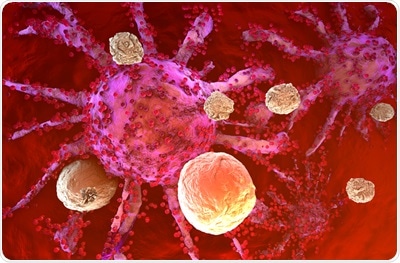A new study by researchers from the Perelman School of Medicine at the University of Pennsylvania shows that experimental immunotherapy can temporarily reprogram the immune cells of patients. Like the mRNA-based COVID-19 vaccines, this immunotherapy can attack a specific target through a single injection of messenger RNA (mRNA).

Image Credit: University of Pennsylvania School of Medicine.
The researchers presented the new method with an mRNA preparation that reprograms T cells, a type of powerful immune cell, to attack the fibroblast cells of the heart. Heart failure is often caused partially by these fibroblast cells, which respond to inflammation and heart injury by constantly overproducing fibrous material that, in turn, stiffens the heart muscle and impairing heart function—a condition known as fibrosis.
Experiments carried out in mice that model heart failure, the decrease in cardiac fibroblasts caused by the reprogrammed T cells resulted in a dramatic reversal of fibrosis. The study was published on January 6th, 2022, in the journal Science.
Fibrosis underlies many serious disorders, including heart failure, liver disease, and kidney failure, and this technology could turn out to be a scalable and affordable way to address an enormous medical burden. But the most notable advancement is the ability to engineer T cells for a specific clinical application without having to take them out of the patient’s body.”
Jonathan A. Epstein MD, Study Senior Author and Chief Scientific Officer, Perelman School of Medicine at the University of Pennsylvania
Jonathan A. Epstein is also the executive vice dean and the William Wikoff Smith Professor of Cardiovascular Research in the Perelman School of Medicine.
The new method is based on chimeric antigen receptor (CAR) T cell technology. Until now, this technology needed the harvesting of a patient’s T cells and their genetic reprogramming in the laboratory to recognize markers on particular cell types present in the body. These specially targeted T cells can be multiplied with the help of cell culture techniques and get reinfused into the patient to attack a particular cell type.
Researchers from Penn and Children’s Hospital of Philadelphia were the first to develop the CAR T cell therapy and get it granted by the U.S. Food and Drug Administration in 2017 for fighting against certain leukemias—and further approved for lymphoma—that come up from immune cells known as B cells.
Even though CAR T cell technology is presently used mainly for cancer treatment, with surprising results in several—otherwise—hopeless cases, the developers have long-visualized implementing the technique for other diseases as well. Epstein and his colleagues, in a 2019 study, presented that the standard CAR T cell approach can be employed to combat hyperactive cardiac fibroblasts and re-establish heart function in a heart failure mouse model.
On the other hand, this standard CAR T cell strategy would be troublesome if directed against heart failure or other fibrotic diseases. Fibroblasts have a simple and key function in the body, particularly in the healing of wounds. CAR T cells that are re-engineered genetically to fight fibroblasts could live in the body for several months or years, controlling the fibroblast population and impairing wound healing throughout.
Thus, in the new research, Epstein and his colleagues devised a procedure for a more temporary and manageable, and technically much simpler, type of CAR T cell therapy. They designed mRNA that could encode a T-cell receptor targeting activated fibroblasts.
Also, they encapsulated the mRNA within small, bubble-like lipid nanoparticles (LNPs)—covered in molecules that home in on T cells. Now, the technology is also important to the mRNA COVID-19 vaccines use across the world.
Standard CAR T cell technology involves modifying patients’ T cells outside the body, which is expensive and difficult to scale for common diseases or for use in less wealthy countries. Making functional CAR T cells inside the body greatly extends the promise of the mRNA/LNP platform.”
Drew Weissman MD, PhD, Study Co-author and Roberts Family Professor, Vaccine Research, Perelman School of Medicine at the University of Pennsylvania
Once injected into mice, T cells take up the encapsulated mRNA molecules and act as templates for the generation of the fibroblast-targeting receptor, while efficiently reprogramming the T cells to fight against activated fibroblasts. However, this reprogramming is very temporary. The mRNAs are not integrated into T-cell DNA and live inside T cells for only some days, after which the T cells come back to normal and do not target fibroblasts any longer.
The researchers discovered that, in spite of this brief period of activity, mRNA injections in mice that model heart failure successfully reprogrammed a large population of mouse T cells, leading to a major reduction of heart fibrosis in the animals with a restoration of almost normal heart size and function without any evidence of continued anti-fibroblast T cell activity after one week of treatment.
Researchers, with the hope of eventually starting clinical trials, are continuing to analyze this mRNA-based, transient CAR T cell technology.
Source:
Journal reference:
Rurik, J. G., et al. (2022) CAR T cells produced in vivo to treat cardiac injury. Science. doi.org/10.1126/science.abm0594.